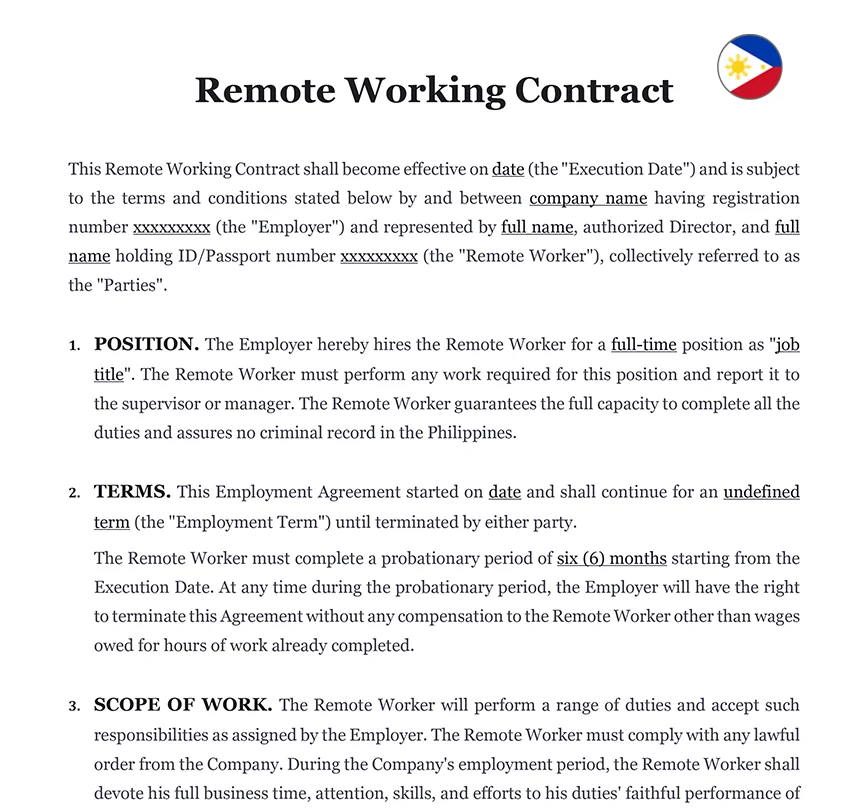Ready to use legal template
Drafted by experienced lawyers
Compliant with Filipino law
Ready to use legal template
Drafted by lawyers
Compliant with Filipino law
Learn more about Remote Working Contract in Philippines
Using an Employment Contract in the Philippines is important for both employers and employees as it sets out the terms and conditions of the employment relationship. The contract helps to establish a clear understanding of the rights and obligations of both parties, such as the employee’s job duties, compensation, benefits, working hours, and other important details. It can also help to prevent misunderstandings or disputes that may arise during the course of employment. Under Philippine labor laws, an Employment Contract is required for all regular employees, and failure to provide one may result in legal liabilities for the employer. Download this Employment Contract template written by lawyers in accordance with Philippine law in an easy to edit Word document.
Table of contents
What is a Remote Working Contract?
A Remote Working Contract, also known as a telecommuting agreement or remote work agreement, is a legally binding document that establishes the terms and conditions between an employer and an employee who will be working remotely. It outlines the rights and responsibilities of both parties and provides clarity on various aspects of remote work, such as work schedule, performance expectations, communication protocols, data security, and compensation.
When to use a Remote Working Contract?
A Remote Working Contract should be used when an employer allows or requires employees to work remotely, either on a full-time or part-time basis. It is particularly relevant in situations where employees are not physically present at the company’s office or work location but perform their duties from a remote location using technology and communication tools.
What are the advantages of remote work in the Philippines?
Having a Remote Working Contract in the Philippines offers several advantages for both employers and employees. Firstly, it provides clarity and sets clear expectations regarding work arrangements, ensuring that both parties are on the same page. The contract helps establish guidelines for work hours, availability, performance metrics, and communication protocols, thereby fostering productivity and accountability.
Secondly, a Remote Working Contract can address important legal and compliance matters. It allows employers to define data security and confidentiality measures, intellectual property rights, and any applicable employment regulations in the Philippines. This protects both the employer and the employee and ensures that remote work is conducted in a legally compliant manner.
Furthermore, a Remote Working Contract promotes a healthy work-life balance by setting boundaries between work and personal life. It can outline guidelines for overtime, leave entitlements, and work hours, helping to prevent burnout and ensure employee well-being.
What does a Remote Working Contract include?
A Remote Working Contract should include several key components to ensure a clear and comprehensive understanding between the employer and the employee. These components may vary depending on the specific needs of the organization, but common elements include:
1. Job duties and responsibilities
Clearly define the tasks and responsibilities of the remote employee.
2. Work schedule
Specify the working hours, including start and end times, breaks, and availability for meetings or collaboration.
3. Communication protocols
Outline preferred modes of communication, frequency of check-ins, and expectations for responsiveness.
4. Performance expectations
Establish measurable performance metrics, targets, and deliverables.
5. Equipment and technology
Clarify the provision and maintenance of necessary equipment, software, and tools for remote work.
6. Confidentiality and data security
Define protocols for handling sensitive information and safeguarding data.
7. Compensation and benefits
Specify the salary, payment terms, and any applicable benefits or allowances.
8. Termination and dispute resolution
Include provisions for contract termination, notice periods, and mechanisms for resolving disputes.
ℹ️ Themis Partner offers you an Employee Warning Letter and Employment Termination Letter for the termination of a Remote Working Contract. In addition, the Employee Confidentiality Agreement document enables you to protect your company’s information and interests.
What are the legal requirements for Remote Working Contracts?
In the Philippines, there are several legal requirements that should be considered when drafting a Remote Working Agreement. These requirements may include compliance with labor laws, data privacy regulations, and any industry-specific regulations or standards. It is important to consult with legal professionals or seek guidance from relevant government agencies to ensure compliance with these requirements.
Employers must adhere to the Labor Code of the Philippines, which governs various aspects of employment, including working hours, rest periods, overtime, leave entitlements, and employee benefits. Additionally, the Data Privacy Act of 2012 imposes obligations on employers to protect the privacy and security of personal data collected from employees during remote work.
By adhering to these legal requirements, employers can create a Remote Working Contract that protects the rights and interests of both parties while ensuring compliance with Philippine laws and regulations.
How to terminate a Remote Working Contract?
A written employment contract is a crucial document in the Philippines and it should be executed before the employee begins work. The following are some of the important details that must be included in a written employment contract in the Philippines:
Terminating a remote working contract in the Philippines should be done in a fair and legally compliant manner. Here are the steps to terminate a remote working agreement:
1. Review the Contract: Start by reviewing the terms and conditions outlined in the remote working contract. Look for provisions related to termination, notice periods, and any specific procedures to follow. Adhere to the termination provisions specified in the contract to ensure compliance.
2. Provide Notice: Typically, remote working contracts require a notice period for termination. Provide written notice to the remote employee stating your intention to terminate the contract. The notice period may vary depending on the contract terms or applicable labor laws. Ensure that the notice is clear, specific, and delivered through a reliable method such as email or registered mail.
3. Communicate Reasons: It is important to communicate the reasons for termination to the remote employee. Clearly articulate the reasons behind the decision, whether it’s due to performance issues, changes in business needs, or other justifiable grounds. Maintain professionalism and respect during the communication to minimize potential conflicts.
4. Offer Assistance and Support: Depending on the circumstances, consider offering assistance and support to the remote employee during the transition period. This may include providing guidance on job search resources, offering references, or providing any necessary documentation or information to facilitate their departure.
5. Settle Financial Matters: Address any outstanding financial matters related to the termination. This includes ensuring that the remote employee receives all owed payments, benefits, or reimbursements as per the contract and applicable labor laws. Calculate final wages, unused leaves, or any other entitlements and settle them in a timely manner.
6. Collect Company Property: Request the remote employee to return any company property or resources in their possession. This may include laptops, mobile devices, access cards, or any other assets provided for work purposes. Specify a deadline for the return of these items and provide instructions for their safe and secure return.
7. Update Employment Records: Update your employment records to reflect the termination of the remote working contract. Make the necessary changes to employee records, payroll systems, and any other relevant documentation to ensure accuracy and compliance with legal requirements.
8. Maintain Confidentiality: Emphasize the importance of maintaining confidentiality and data privacy even after the termination. Remind the remote employee of their obligations regarding the protection of confidential information, trade secrets, or sensitive data acquired during their employment. The use of a Non-Disclosure Agreement can be usefull to ensure a full protection of your company’s data and information.
9. Seek Legal Advice if Necessary: In complex termination cases or situations involving disputes, it is advisable to seek legal services from an employment lawyers. They can provide guidance on the specific legal requirements, obligations, and potential risks associated with terminating a remote working contract.
SPECIAL OFFER
HR Pro
15 Document Package
Essential documents for managing employees in the Philippines
Remote Working ContractTemplate (.docx)
Save on attorney fees
310 client reviews (4.8/5) ⭐⭐⭐⭐⭐
Share information
Why Themis Partner ?
Make documents forhundreds of purposes
Hundreds of documents
Instant access to our entire library of documents for Philippines.
24/7 legal support
Free legal advice from our network of qualified lawyers.
Easily customized
Editable Word documents, unlimited revisions and copies.
Legal and Reliable
Documents written by lawyers that you can use with confidence.




